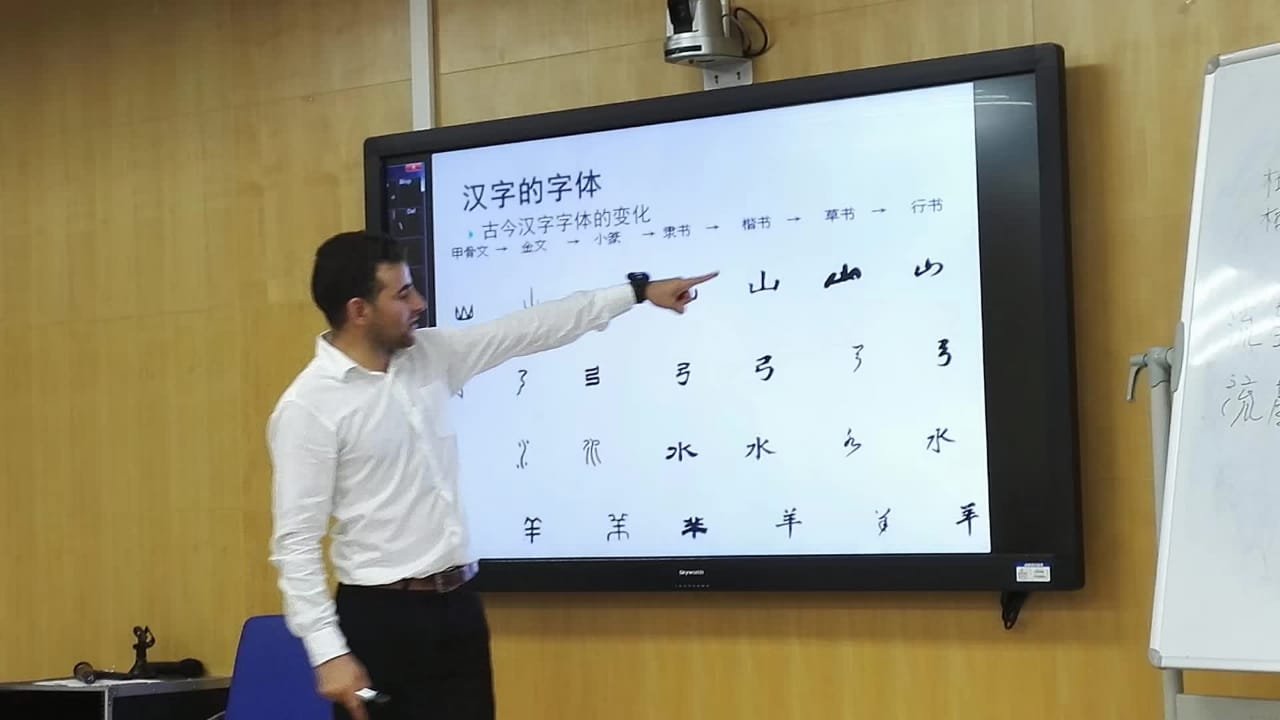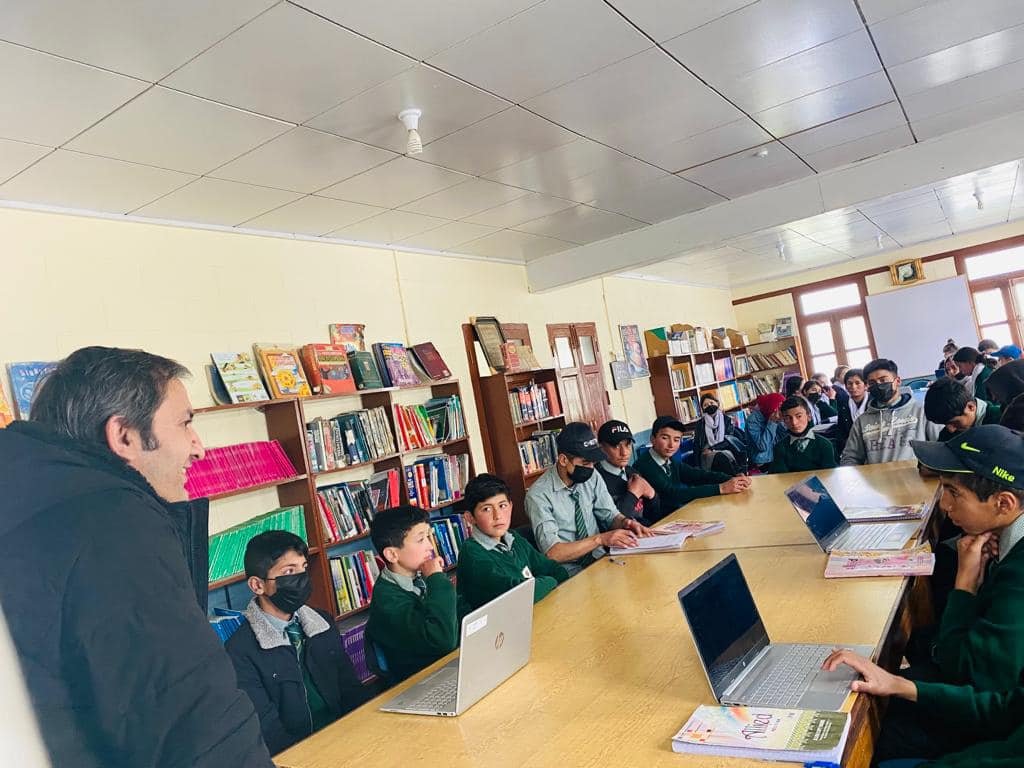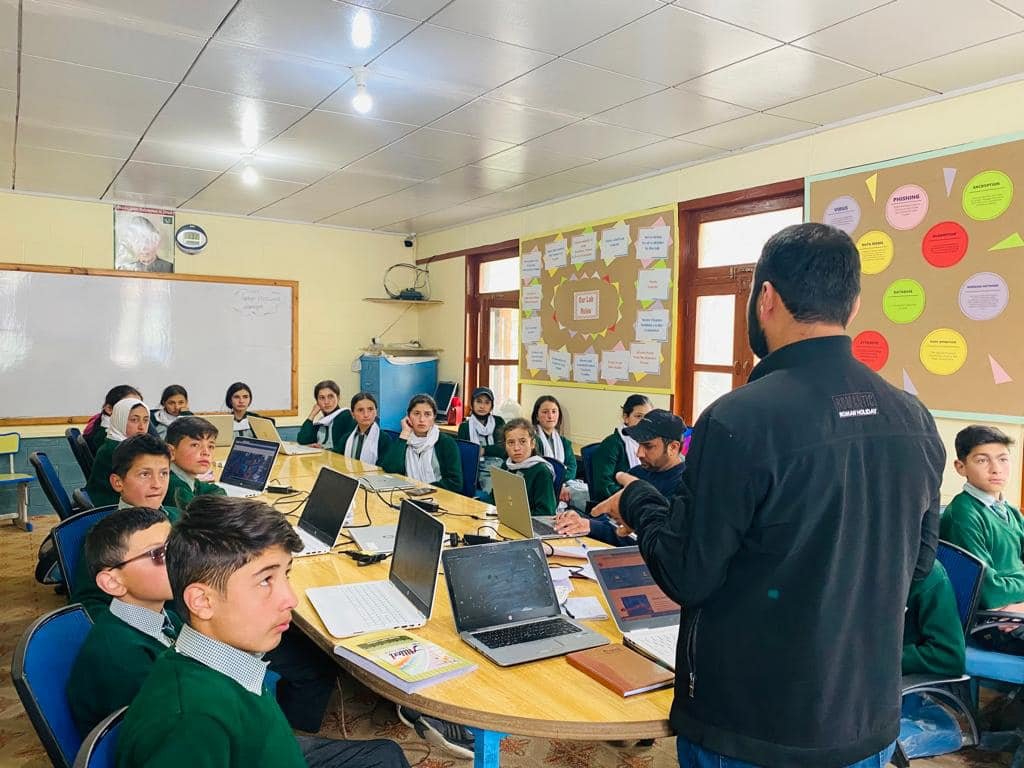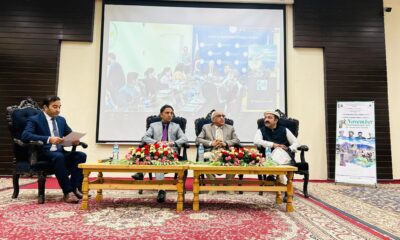Education
The provision of Quality Education is the Top-most priority of our government – Raja Azam Khan


Gilgit-Baltistan Education Minister Raja Azam Khan in an exclusive interview with the The Karakoram Magazine sheds light on challenges and issues related to education, proposed educational reforms of his government and future plans to tackle challenges of Covid-19.
TK : We congratulate you on assuming charge of Minister Education. What were some of the biggest challenges of the education system, when you took the reins of ministry?
Raja Azam Khan: Thank you very much for giving me this opportunity to express my views about the education system and the current issues related to it. It’s a pleasure for me and I really appreciate that the Karakoram International University has launched a grand initiative to issue a monthly magazine in English “The Karakoram” which is covering a wide range of topics on local, national, and international issues. KIU has a principal role to play in this cause of introducing Gilgit Baltistan to the outside world. This magazine will open new vistas of economic prosperity in the region and would also be of great interest to the business community.
As far as educational challenges and issues are concerned, Quality and access to basic education is still a major issue in our rural areas and students of far flung areas face difficulties during harsh weather conditions. Only a few districts have emphasized the construction of secondary schools and colleges. As a result, beyond primary school, there is no permanent system of education for children. Hundreds of primary schools are lacking teachers. There is dire need to upgrade infrastructure of rural schools and also appoint competent teachers to enhance educational standards. Also, Gilgit-Baltistan is in dire need of professional and technical institutions and Women University or Sub Campus of Karakoram International University for women should also be established at earliest. Some districts of Gilgit-Baltistan have higher levels of literacy rate while some districts are lacking in education due to socio-economic issues. The situation of women education in Gilgit-Baltistan is also unsatisfactory and one the most pressing issue is high dropout rate of girls at primary level. It is also imperative to establish professional development centres for teachers to enhance their professional capability, recruit teachers on merit and legislation should be done to make teaching licence mandatory in all schools of Gilgit-Baltistan
TKM : In the PTI manifesto, Education reforms including modernization of infrastructure and digitalization of education were a major priority. What is your government’s contribution to the enhancement of those reforms?
Raja Azam Khan: Education is the top priority of the current government. This can be estimated from the budget of millions of rupees allocated for education this year. The new education policy focuses on the provision of education and skills in line with employment opportunities and the use of technology in the education system. New schools and colleges will also be built to provide the best educational facilities to the students, while the existing schools are also being upgraded. Our mission is to educate and provide the best educational facilities to every student in the entire province and we are launching smart school programs in line with the requirements of modern times
We are also planning to trifurcate educational department of Gilgit-Baltistan into three separate directorates for the purpose of uniformity and qualitative improvement, at all levels of education.We are committed to establish professional and technical institutions in Gilgit-Baltistan and first-ever medical college of Gilgit-Baltistan will be set initiated by our government.Prime Minister Imran Khan during his recent visit to Gilgit has also announced the first of its kind Ehsaas secondary education conditional cash transfer (CCT) programme for secondary school going children of deserving household. On the directions of Prime Minister Imran Khan, The Higher Education Commission has announced undergraduate scholarships for the students of Gilgit-Baltistan to study in top universities and educational institutions of Pakistan. The scholarship will cover tuition, hostel fee, and other education-related expenses amounting to a maximum of Rs240, 000 per year.

TKM : The PTI government has approved Single National Curriculum and Uniform education all over the country. What action does your ministry is taking to implement it in Gilgit-Baltistan?
Raja Azam Khan : One of the Promise made by the PTI government to the people before coming to power including the implementation of a ‘single national curriculum’ in the country, as Prime Minister Imran Khan believes that the current education system in the country is class-based and is a major source of causing a lot of problems within the society. Single National Curriculum is a step in which there is one system of Education for all, in terms of curriculum, medium of instruction and a common platform of assessment so that all children have a fair and equal opportunity to receive high quality education. The government is developing a model textbook that will be distributed to provinces, public schools, private schools, and madrassas, with the authority to add or change it while adhering to the main points of the national curriculum. We are implementing the Single National Curriculum in all public, private schools as well as seminaries offering primary level education in its true spirit to end disparities in the education system.
TKM : How has your ministry tackled the challenges of Covid-19 pandemic and what is your take on future planning to meet the challenges of the new normal?
Raja Azam Khan : The education sector in Gilgit-Baltistan has been seriously affected by Covid-19 Pandemic and it has dismantled traditional educational patterns. While countries worldwide were shifting educational infrastructure from physical classes to online, we were facing an unprecedented crisis regarding teachers training, internet access and computer availability for students. We had a responsibility to ensure strict implementation of Covid-19 related safety SOPs at schools and colleges and also minimize learning losses of the students, so education department initiated various initiatives to reach students through online teaching, delivering course resources at their door steps and motivating their parents to create a learning environment at home.
Education in our remote areas having patchy internet coverage suffered and our students had to face more difficulties as compared to students of metropolitan cities. Our government has expedited work on provision of 3G and 4G internet services for citizens of Gilgit-Baltistan and 4G cellular spectrum auction was approved recently and we are hopeful that fast internet connectivity will help youth in getting an online education in case of Covid lockdown. Education and learning have suffered substantially due to covid and our government is planning to revamp traditional mode of education and introduce digitisation in the educational system to meet the challenges of the future.
TKM : What are the steps taken by your ministry to facilitate higher education institutions like Karakoram International University?
Raja Azam Khan : As the Provincial Education Minister, I intend to make every effort to bring this great institution in line with the requirements of the modern age, and in this regard, I will make liaison with university authorities to provide full support from the provincial government. The acceptance of this university at the national and international levels is a testament to the fact that we are moving in the right direction. The government will assist the university authorities in establishing a university board in the manner of other universities and will do everything possible to provide the university with the infrastructural amenities as well scholarships to our needy students. Also we will formulate a mechanism to allocate funds in our provincial ADP for promotion of research at Karakoram International University so that our students can investigate causes of deprivation and guide us to formulate policies to alleviate poverty and other socio-economic issues. Also in the recently announced mega developmental package for Gilgit-Baltistan, our government in consultation with management of Karakoram International University has also approved funds for construction of a new academic block as well as other infrastructure facilities required by the University. Our government has also approved construction of a sports academy at Karakoram International University under Kamyab Jawan Program.
Interviewers:
Sehrish Kanwal , KhanAhsan Raza, Ringchan Amar Shigri
Education
The Learning Deficit: Unmasking the Failings of Education and Overcoming the Obstacles.

Spectacularly, the education system, which most of us will not be shocked to get to know, refers to the coordination of individuals — among teachers, — administrators, and students. Above all, it demands infrastructure — including safe facilities and transportation, to be functioning institutions and systematic processes.
Similarly, the system of education, radically, is linked to the transmission of knowledge, which allows the socialization of people.
In addition, I would go along the chasmic view that the education sector, prominently, is supposed to provide superior human resources to all areas of national life. It builds, — stabilizes, — and keeps the nation on the move, and among citizens, probably, enhances a sense of civility, patriotism, and super good understanding.
To get notched educational goals up, curriculum plays a vital role as a pillar does in the building.
But. Ruefully, for us, an effective system of education has always been a wish to be fulfilled. That is to say, we, for the good, have gotten ourselves stuck in a fallacious and tedious chain of the education system. Imagine, being attached to the — syllabus — which — almost— erroneously brings us approximately two decades back. For sure, our syllabus is expired and we can’t even think of competing with the current epoch of education with the quality we have.
Likewise, Pakistan, more often than not, lacks the most identified tactics to adopt technologies in curriculum, but conversely, in foreign countries, strategies are made in such a way that curriculum changes with the updation of technologies. As aforementioned, in Western countries, the education system is student-oriented, enhancing superior qualities like critical thinking, problem-solving skills, and formulating new ideas, above all, having the concept “Study to Understand, not memorize” weighs students’ motivation.
But, on the other hand, in our country ” Teacher” holds the remote, He controls, His opinions are undeniable and we are merely supposed to memorize selected numbers and facts. Isn’t it too uncanny?
Although, to overcome these hindrances, I have jotted the potential solutions down here:
1. Curriculum amendment:
In this competitive market environment, curriculum amendment must be taken into account regularly, so that the need for updated courses can be ensured and the incorporation of modern teaching methodologies, problem-solving skills, and critical thinking, similarly, enhance the learning experience for students for the good.
2. Quality Improvement:
If it comes to quality of education, the most primitive and prominent factors like the availability of learning resources, such as technology, laboratory, and updated textbooks should be the priority of the government and there should be professional development opportunities for teachers so that services by them can be rendered in most effective and required way to retain the quality education in rapidly changing environment.
3. Community Engagement:
To overcome educational barriers, local communities, and civil society should be involved in contributing their relentless efforts, and gatherings like,
Awareness campaigns, and parent-teacher associations, can promote the value of education and create a supportive environment for learning as well.
4. Increased Investment:
Education improvement, no doubt, demands a high rate of investment, so the national budget, therefore, should be allocated in such a that it can minimize infrastructure deficiencies and improve the quality of learning resources.
5. Enhancing Access and Enrollment:
There should be a proper path to implement the strategic perceptive of learning and to promote easy access to education by getting infrastructure done, especially for remote areas, which is essential.
6. Public-private partnerships:
It is obvious that allocation of resources, identification of expertise, and adoption of innovative tactics, are only possible if there is an existence of collaboration between the public and private sectors. Moreover, public-private partnerships can assist bridge gaps in technical access, fundraising, and most identified programs.
The above-mentioned solutions demand a closer scrutiny, commitments, and long-term planning. By analyzing these key solutions, Pakistan can get rid of educational dilemmas and can easily get access to a high-quality education system that in turn, will prepare its citizens to survive in this dog-eat-dog epoch and to embrace challenges in the days to come.
Education
Chinese Language and its Significance in the Modern Era

Chinese language
Charlemagne, Holy Roman emperor, said, “To have a second language is to have a second soul”. So, I’ll be speaking to you using language … because I can. This is one these magical abilities that we humans have. We can transmit really complicated thoughts to one another.
Now of course, there isn’t just one language in the world, there are about seven thousand languages spoken around the world. And all the languages differ from one another in all kinds of ways. Some languages have different sounds, they have different vocabularies, and they also have different structures.
Over 7000 languages are spoken across the world today. Chinese, the language with the most native speakers, has 13 variations, whilst similarly; this reflecting the importance and the wide range of countries and cultures it is spoken. Chinese stands out as the most spoken language in the world with over an estimated more than 1.3 billion people in China and various other parts of the world speaking it. One can easily assume this makes Chinese one of the most important languages on the planet. China as a country is growing by leaps and bounds as a world greatest economic and military power.
Recent studies have shown that Chinese has become a popular choice for a second language among college students. Surpassing the previous favorite that includes Spanish, French, and German languages. This increasing popularity isn’t surprising since the growing appeal of Chinese culture in the west and worldwide.
Governments in the US and the UK are increasingly recognizing the importance of offering Chinese language classes in the school systems. One 2008 poll of employers in the UK, done by the Confederation of British Industry, discovered that 38% of employers answering the poll wanted to hire people who spoke either Mandarin or Cantonese. (The two were lumped together in the survey.) French speakers and German speakers ranked higher, at 52% and 43% respectively. Spanish was desired by 28% of employers.
The UK Schools Secretary said, in part as a result of this survey, that he would like every teenager to have a chance to learn Mandarin. He would also like to see Japanese, Arabic, Portuguese, and Indonesian offered more widely than they are at present. One secondary school in seven in the UK is already teaching Mandarin.
Now, more and more non-Asian parents see learning Chinese as a useful tool for their children, one that will help them compete for top jobs. The US government also sees the benefits of a good pool of Chinese speakers. Some of the school districts in the internationally-minded suburbs of Washington, DC, have offered Mandarin for decades.
Countries with a Chinese speaking population or Chinese as a widely spoken language
- Chinese Speaking Countries in Asia
- China Hong Kong Macau
- Tibet (Tibet Autonomous Region within PR China)
- Singapore
- Taiwan (Republic of China)
Countries with a significant number of Chinese speaking populations (more than 5 million)
- Indonesia (Java and Bali)
- Malaysia (Peninsular)
- Thailand
Mandarin is an official spoken language in China, Taiwan, and Singapore. Cantonese is an official spoken language in Hong Kong and Macau.
Since the invention of the Chinese Pinyin tonal system has made learning Chinese a lot easier than it was previously. The importance of Chinese Pinyin is a crucial method when it comes to writing Chinese in a romanized alphabet. Hanyu pinyin spells the sound and includes tone marks to help give you the proper pronunciation. Knowledge of the written language opens up the culture of one of the world’s oldest civilizations.
Before China’s reform in the 1970s, China was an isolated country that didn’t accept any tourism. After 1970, China has become one of the leading tourist destinations. The Great Wall of China might be one of the most traveled to places on Earth but other wonders of China include the Forbidden City in Beijing, the Terracotta Army in the Qin Empire Emperor Mausoleum, the Yangtze River, and the Potala Palace. Even if you’re just a casual traveler, learning some Chinese to understand street signs, order food, or just communicating with people you meet on the street, a most pleasant and enjoyable experience.
Significance of Chinese Language for Pakistani Students
The Chinese language is becoming increasingly important for Pakistani students due to various reasons such as the growing economic ties between Pakistan and China, the increasing number of Chinese companies investing in Pakistan, and the Chinese government’s efforts to promote its language and culture around the world. Learning Chinese can provide Pakistani students with numerous benefits such as:
Friendship: Learning Chinese can help Pakistani students to build stronger relationships with the Chinese people and develop a deeper understanding of Chinese culture and monetary system.
Jobs: With the increasing presence of Chinese companies in Pakistan, knowing Chinese language can make Pakistani students more competitive in the job market. In addition, many Chinese companies operating in Pakistan prefer employees who can speak Chinese fluently.
Scholarships: The Chinese government offers a large number of scholarships to Pakistani students each year to study in China. These scholarships are primarily aimed at students who are interested in studying the Chinese language, culture, and other academic fields. Knowing Mandarin can increase the chances of Pakistani students obtaining these scholarships.
Economic Opportunities: China is the world’s second-largest economy and a major trading partner of Pakistan. Therefore, proficiency in the Chinese language can open up job opportunities for Pakistani students in various sectors such as trade, finance, and tourism.
Cultural Exchange: Learning Chinese will enable Pakistani students to better understand and appreciate the Chinese culture. This can lead to better cultural exchange, cooperation, and understanding between Pakistan and China.
Academic Opportunities: Chinese is one of the most widely spoken languages in the world, and China is home to some of the best universities in the world. Therefore, learning Chinese can provide opportunities for Pakistani students to study in China and pursue higher education in various fields.
International Relations: Pakistan and China have a close relationship, and knowing the Chinese language can help Pakistani students to communicate and engage with Chinese officials, businessmen, and tourists. This can further strengthen the bilateral relations between the two countries.
Future Prospects: China is rapidly growing as a global superpower, and proficiency in Chinese can provide a competitive edge for Pakistani students in the job market. As China continues to expand its influence, Pakistani students with Chinese language skills will be in high demand.
Institutions offering Chinese language in Pakistan:
Confucius Institutes: Confucius Institutes are educational institutions affiliated with the Chinese Ministry of Education that promote Chinese language and culture around the world. Currently, there are five Confucius Institutes and two Confucius Classrooms across Pakistan, located in Islamabad, Faisalabad Lahore, Karachi, and Punjab.
According to the Pakistani think-tank Pakistan-China Institute, between 26,000 and 30,000 students are studying the Chinese language at various levels in Pakistan.
National University of Modern Languages (NUML): NUML is a public research university in Islamabad that offers courses in various languages, including Chinese.
Allama Iqbal Open University (AIOU): AIOU is a public research university in Islamabad that offers a Chinese language course as part of its curriculum.
Punjab University: The Department of Chinese Language and Culture at Punjab University in Lahore offers courses in Chinese language and culture.
Islamabad Chinese Language Institute: The Islamabad Chinese Language Institute is a private language institute in Islamabad that offers Chinese language courses at various levels.

China Study Centers: The Higher Education Commission (HEC) of Pakistan has established six China Study Centers in different universities across the country, including the China Study Center at Karakoram International University in Gilgit-Baltistan. These centers aim to promote research, academic exchanges, and the learning of the Chinese language and culture in Pakistan. They also aim to enhance cooperation and understanding between Pakistan and China in various fields, including economics, trade, and politics. More than 300 students till the date have completed basic Chinese language under China Study Center Karakoram International University. It’s worth mentioning here that, the Karakoram International University has required students to learn one semester of Chinese language as part of their degree program. It appears that Chinese is the designated language for all departments to teach to their BS degree students. Learning a foreign language can be a valuable skill for students, as it can improve their cultural understanding and communication abilities in a globalized world.
Overall, learning Chinese can be beneficial for Pakistani students in terms of enhancing their personal, academic, and professional growth, and there are several institutions in Pakistan that offer Chinese language courses to facilitate this process.
Chinese is becoming one of the most important languages when it comes to operating an international business.
The Chinese market is the biggest growing market even in this economic downturn. Expertise in Chinese has grown increasingly important to the overall global economy and many business owners are looking to break into this international market. Any business in the twenty-first century will be trying to do business in China and in doing so will be required Chinese speakers to negotiate agreements and develop these trade deals. Economist predicts by 2020, China will without a doubt surpass the United States as the biggest international superpower.
The importance of Chinese is beneficial regardless if you do it for fun or for your career or even just for personal travel. When trying to uncover the importance of Chinese. One cannot discover a more fascinating and challenging language to learn.
All languages evolve with time and Chinese is no exception. To indisputably understand the importance of Chinese language you have to learn the actual language yourself to help you receive the full benefit of this amazing language later. In fact, the latest research has shown that learning a second language helps fight against Alzheimer’s disease and slows down the aging effects of the brain.
Talk about the Importance of language in action!
Why Learn Chinese – Ten Reasons to Learn Chinese
You probably already have your own reasons to learn Chinese but in case you don’t have one already or still looking for more reasons to get motivated to learn Chinese.
This article should help you answer the question “Why learn Chinese?”
1 – Mandarin Chinese is the Most Spoken Language in the World
One of the biggest reasons to learn Chinese should because Mandarin Chinese is spoken by roughly a quarter of the world’s population which is estimated to be around two billion Chinese-speakers. Not all of them live in mainland China, but in parts of Taiwan, Singapore, and throughout southeast Asia.
2 – Chinese Influence on International Cultures
Second, traditional Chinese culture, from Confucianism and Chan Buddhism to martial arts and Chinese cuisine, has an enormous influence on East and Southeast Asian nations. Chinese culture has also greatly inspired the western world through Marco Polo, G. W. Leibniz, Max Weber, Franz Kafka, Andre Malraux, Bertolt Brecht, Ezra Pound, and Luis Borges, among others.
3 – Traveling to China is Increasingly Foreigner Friendly
In the past, China wasn’t very accessible from outside visitors wanted to travel there. But travel to China recently as become a lot easier back and forth from.
4 – With Chinese Pinyin Learning Chinese is Easier
You don’t have to learn Chinese characters to learn how to speak Mandarin Chinese. Pinyin is a method of writing Chinese in the romanized alphabet. Hanyu pinyin spells the sound and includes tone marks to help give you the proper pronunciation.
5 – Fastest Growing Economy in the World
China is currently the fastest growing economy in the world and is already the biggest global market to break into. Any business in the twenty-first century will be trying to do business in China and in doing so will require Chinese speakers to negotiate agreements and trade deals.
6 – Reading Chinese Literature
The dialects are not mutually intelligible but the written language is shared between them all. Although you do not need to learn to read Chinese characters to speak the language, by doing so you open the door to an enormously diverse and rich literature. In fact, the earliest record of writing was in Chinese characters although very different in form from modern characters (of which there are many thousand).
7 – Growing Presence of Chinese Speakers all around the world
Communities of Chinese Speakers have been popping up outside Chinese in parts of the United States and Europe.
8 – Learn Chinese as a Hobby/Love of Learning Languages
Maybe you are just one of those people that just enjoy learning languages for the fun of it! Once you’ve mastered the urge to learn more becomes pretty strong. Contrary to popular opinion, not much confusion happens between languages.
9 – Rich Cultural History of Chinese on the World
Learning Chinese is immediately linked to learning Chinese culture. Learning becomes a more extraordinary and enjoyable experience. Chinese has a unique ideographic writing system, which provides visual comprehensibility.
The grammatical structure of Chinese is not only logical but also pragmatic, related to the particular way of Chinese thinking. Knowledge of the written language opens up the culture of one of the world’s oldest civilizations.
10 – There are Scholarship Opportunities for Chinese Studies
Because of the higher demand for people speaking Chinese, many of the world’s governments and agencies have been offering scholarships and other opportunities for individuals who are interested in Chinese studies and learning Chinese.
Mandarin Chinese is truly an amazing language to learn. I hope you find this article helpful in narrowing and strengthening your reasons to learn Chinese.
Education
KIU Launches Campus Management System with Local Challenge Fund Support for Al-Amyn School Gulmit, Gojal

Karakoram International University (KIU) has launched a Campus Management System for Al-Amyn School in Gulmit, Gojal with financial support from the Higher Education Commission of Pakistan and the World Bank through the Local Challenge Fund. The project aims to fully automate the teaching and learning activities of sixteen schools (eight private and eight government) in the region and train the staff, faculty, and students on the indigenously developed Campus Management system.
The launch event included a training session led by the Project’s Principal Investigator, Dr. Aftab Ahmed Khan, for the faculty, students, and administrative staff of Al-Amyn School. The School Campus Management System is a customized management system developed by the KIU team to automate teaching and learning activities, ensuring efficient and effective management of academic and administrative functions.

The community representatives of Gulmit, the Principal, and staff of Al-Amyn School appreciated the project activities and are happy to have a fully automated teaching and learning system in their school. The system will help in managing the academic progress of students, tracking attendance, managing assignments, and managing teacher-student communication.
During the training session, Dr. Aftab emphasized the importance of using contemporary technologies like AI-based systems in educational learning and teaching activities to equip the new generation with modern skills to compete in the global job market. The indigenously developed Campus Management System is not only a milestone for the schools in the region, but it is also a stepping stone in the integration of technology in education in Pakistan.

The Campus Management System project will help in achieving the Sustainable Development Goal 4 (SDG4), which focuses on ensuring inclusive and equitable quality education and promoting lifelong learning opportunities for all. The project will create a positive impact on the educational landscape of the region and pave the way for other schools to adopt the Campus Management System.
Similar training sessions will be held in other project schools in the near future, ensuring the successful implementation of the Campus Management System and providing support to schools in the region to make a positive impact on the educational system of Pakistan.
-

 Tourism3 years ago
Tourism3 years ago15 Best Places to Visit in Skardu
-

 Arts, Culture & Heritage2 years ago
Arts, Culture & Heritage2 years agoTraditional women’s dresses of Gilgit-Baltistan
-

 KIU Corner2 years ago
KIU Corner2 years agoA Guide to LMS KIU Student Login – KIU
-

 Arts, Culture & Heritage2 years ago
Arts, Culture & Heritage2 years agoShuqa Simple but amazing winter clothing of Gilgit-Baltistan
-

 KIU Corner2 years ago
KIU Corner2 years agoEmbracing Challenges: Gul Rukhsar’s Remarkable Journey
-

 Arts, Culture & Heritage3 years ago
Arts, Culture & Heritage3 years agoQuroot: A Nutritious and Flavorful Staple of Gilgit-Baltistan’s Cuisine
-

 Arts, Culture & Heritage2 years ago
Arts, Culture & Heritage2 years agoTraditional houses Gilgit-Baltistan
-

 Tourism2 years ago
Tourism2 years agoDiscover the Unparalleled Beauty and Culture of Gilgit-Baltistan


















